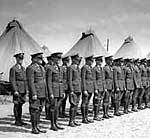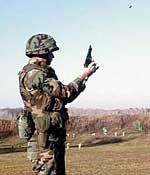By Tim Post
Minnesota Public Radio
November 27, 2001
There's been a military presence in central Minnesota since the mid-1800s. Even before Minnesota was a state, the U.S. government built a military outpost called Fort Ripley, seven miles north of present-day Little Falls. Hundreds of federal and state troops were stationed inside the wooden stockade. In the 1920s and '30s, the state bought land to build Camp Ripley in the same area. The camp's purpose was to train Minnesota National Guard troops for war. Seventy years later, Camp Ripley is considered one of the premiere Guard facilities in the country. It still prepares National Guard troops for battle. But the training has taken on new significance since the attacks of Sept. 11.
| |
|
|
|
||
An open meadow next to the Mississippi River in Morrison County is all that's left of Old Fort Ripley. A row of deep depressions sink among the grass. They're faint reminders of the old fort. It's difficult to see, but Dave Hansen can imagine it all.
"As you go along down this tree line - here was the very large and long enlisted quarters, big wood-clad buildings several hundred feet long," says Hansen, executive director of the Minnesota Military Museum.
Most forts built in the mid-1800s were set up to protect settlers. But Fort Ripley was built to keep the Dakota and Ojibwe tribes in Minnesota from fighting each other. Inter-tribal fighting would make the area unattractive to homesteaders.
Hansen says soldiers found duty at Fort Ripley tough. It was lonely, boring and the weather was awful.
"If you were posted out here, you can imagine you were being posted at the end of the earth. This was the western civilization for the United States," Hansen says. "Very, very cold in the wintertime, a lot colder than most troops were used to. In the summertime - very warm and lots of mosquitoes. Just like it is today."
Today the old fort is part of the sprawling 53,000-acre Camp Ripley. The camp got its start in 1931. The state built Camp Ripley to train its National Guard troops for battle. And it's still training soldiers today, even though the technology has changed.
War breaks out quite often at Camp Ripley's Engagement Skills Trainer. Soldiers lie down in front of three screens spread across the entire length of a pitch-black room. They take aim at enemy soldiers with guns that shoot light instead of bullets.
Computers keep track of the soldiers' progress and give them a score when the mission is over. It feels like a big video game.
Staff Sgt. Benjamin Wiscowsky is in charge of the simulator. Wiscowsky says it introduces soldiers to their weapons safely and cheaply.
"You need the bullets, which cost money. Here you have compressed air, and a simulated weapon that makes a noise, and of course if it's raining outside it's a heck of a lot better coming in here - staying dry and shooting," Wiscowsky says. This simulation prepares soldiers for a shootout with an enemy in the woods.
But the mission most Minnesota National Guard Troops are likely to experience soon won't be in the woods, but rather one of Minnesota's airports.
| |
|
|
|
||
Two National Guard soldiers dressed in camouflage patrol the St. Cloud airport - stopping occasionally to check garbage cans for any suspicious items. They're here as part of mission Ice Eagle.
Staff Sgt. David Good says troops in airports all across Minnesota trained at Camp Ripley for the same duty.
"They have random checks here. If they have problems, we are here to assist the airline employees or the airport staff in anyway they need," says Good. "Basically, observation is a big part of our job."
Sgt. Good and his partner, Cpl. Todd Martinez, each have taken a six-month leave from their civilian jobs for deployment in this mission. Good sets up commercial phone systems for Qwest, and Martinez is a prison guard.
They both say the deployment is a big change in their lives. But Cpl. Martinez says he's prepared for the mission.
"I would have never imagined that we would be doing any kind of security at any airports at all. It was quite a shock to me as well to be called to do airport duty," says Martinez. "Most of the guys look forward to deployments and different training in different places. It's just another mission for us and we're going to do it the best we can."
Airport duty could become a permanent job for Minnesota National Guard troops. And if the fear of terrorism remains a part of everyday life, additional duties could be tacked on, such as guarding power plants or borders.
It might not mean a change in the training that goes on at Camp Ripley. National Guard troops are already trained to handle wide range of situations.
But Camp Ripley's Post Commander, Col. Terry Dorenbush, says this new homeland security mission could change the overall role of the Guard.
"The more they ask the Guard to do, the more time that these soldiers are away from their civilian jobs," says Dorenbush. "As missions increase, we are going to have to look at that whole concept of the National Guard - whether it's still viable today, or whether we have to make some changes."
Dorenbush says those changes could include more full time Guard troops, financial help for soldiers pulled away from their jobs, and financial help for their employers, too.
Dorenbush says he's not sure if the country's war on terrorism will mean a busier future for Camp Ripley. The camp is already home to training facilities for the DNR and the State Patrol, and hosts training for soldiers from other states.
But for soldiers in the Minnesota National Guard, the war on terrorism means more work. Troops can no longer consider the National Guard a part-time job. It will take more than one weekend a month, and two weeks a year, from now on.
More Information

